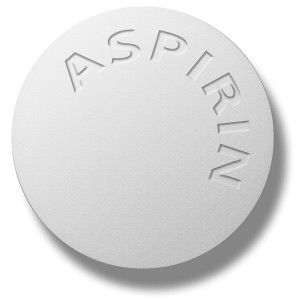…not that it ever was! Aspirin has been known to be a pain reliever for thousands of years. Let’s take a brief look at the additional qualities that should make aspirin one of the meds you’d want to have if stranded on a deserted island.
Heart attacks: Many doctors routinely prescribe a daily aspirin to help prevent heart attacks. In fact, the research was so good that a Nobel Prize in medicine was awarded to those discovering that aspirin prevents the clot formation that leads to heart attacks. It has been estimated by the American Heart Association that up to 10,000 American lives would be saved every year if an aspirin (325 mg) was taken at the first signs of a heart attack. However, it is important to note that the US Food and Drug Administration (FDA) updated its recommendations to state daily use of aspirin should only be in those instances in which individuals already have cardiovascular disease, due to aspirin’s side effect profile.
Strokes: Aspirin has the same preventive effects on stroke development as it does for heart attacks, and daily preventive medicine is now part of many lives for that reason.
Cancer prevention: Aspirin appears to have preventative benefits for certain digestive cancers. Just this week, research published in the Annals of Internal Medicine finds that daily aspirin use at recommended levels for at least five years was associated with a 27% less likelihood of developing colorectal cancer. Additional evidence is strong for presentation of esophageal and stomach cancers, but outside of the digestive tract, conclusive evidence hasn’t presented of yet.
So if you’ve been told to take a daily aspirin to reduce your risk of a heart attack because you likely fell into one a high-risk category, here are some logistical considerations about what to do.
1) Is there a better time of day to take an aspirin?
Recent data suggests that most heart attacks occur early in the morning. The best time to take an aspirin is relatively soon before you have that heart attack. However, since your heart doesn’t give you a heart attack alarm clock (and many of us aren’t especially mindful of heart attack recognition), the best move would seem to be to take an aspirin before going to bed, and recent research supports that an aspirin taken before going to bed offers the most protection from a heart attack. There are limitations to doing this (e.g. taking aspirin on an empty stomach if you have a history of ulcers may not prove to be the most pleasant thing), and you should discuss such timing with your physician.
2) Is there a better dose of aspirin to take?
That’s a question your physician will answer and is dependent on your personal situation. That said, doses as low as 75-81 mg have been shown to be effective. You may be placed on any dose up to 325 mg/day. It really is important to take an aspirin dose recommended by your physician for this consideration.
3) Is it better to chew or swallow an aspirin?
Chewing an aspirin is the quickest way to achieve effective blood levels. In case you were thinking about taking an Alka-Seltzer (which contains aspirin), that’s also good – but it’s just not as good as chewing an aspirin.
Feel free to ask any questions you may have on this topic.
Order your copy of Dr. Sterling’s new book Behind The Curtain: A Peek at Life from within the ER at jeffreysterlingbooks.com, iTunes, Amazon, Barnes and Nobles and wherever books are sold.
Thanks for liking and following Straight, No Chaser! This public service provides a sample of what http://www.SterlingMedicalAdvice.com (SMA) and 844-SMA-TALK offers. Please share our page with your friends on WordPress, like us on Facebook @ SterlingMedicalAdvice.com and follow us on Twitter at @asksterlingmd.
Copyright © 2016 · Sterling Initiatives, LLC · Powered by WordPress



